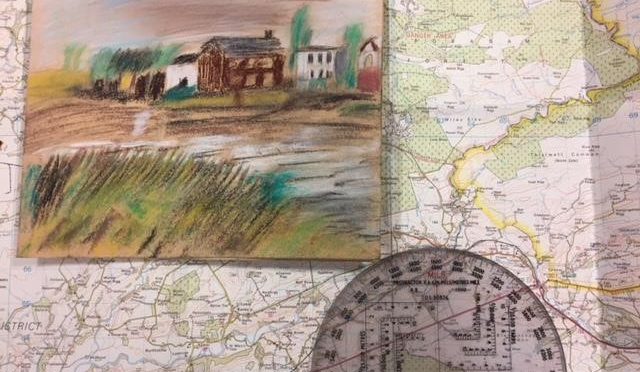Last month we started ‘Line of Sight’, an art project at Forward Assist veteran’s charity in Newcastle. The project is funded by National Lottery Awards for All and is inspired by a conversation with Forward Assist about veteran’s experience and the range card. The range card is used by all branches of the military to direct live fire, either from artillery, portable firearms such as machine gun or mortars, or weapons delivered by aircraft. Yet beyond the battlefield it seemed the range card was helping some veterans to transition into the seemingly uncertain environment of civvy street, by being a emblem of certainty.
This brought to mind art historical work about spatiality in Dutch Landscape painting from the 17th Century being a direct result of innovations in targeting advanced artillery, with the task of targeting the canons falling to the royal artists and geographers. Other academic work has demonstrated that artist throughout history have also been active participants in battlefields by collecting data and intelligence on bridging points, fortifications and landscape features. Innovations such as oil paint in metal tubes that helped the emergence of outdoor painting, were also seen as a threat to combat forces on the battlefield of the Franco Prussian War by being manoeuvrable and easily concealed . Many of these battlefields were captured by the Impressionist painters such as Monet, Degas and Renoir with several of these works being seen, by military of the time, as being operational objects.
So there seemed to be a great opportunity for an art class based on artistic and military seeing with an aim to aid veteran to move from the regimented but predictable structure of military life, to the less certain and arbitrariness of everyday. The first class was held in the mid August and after a pause for the bank holiday resumed last night. Straight away the veterans got to work decoding landscape paintings by Renoir or van Ruisdael identifying areas of risk areas, or tactical advantage. For example a Renoir cornfield presented a risk to infantry that could be mitigated by an air bursting artillery barrage over a distant village and large amounts of smoke across the fields depending on the wind direction. The dips and contours of what had been a flat landscape became very apparent while problems of spatial depth became a matter of using the same skills as ranging firearms.
Perspective drawing and spatiality can be tricky skills to teach. However, it seemed even in the first art class that these are tacit abilities taught through military training, which the veterans have brought to the art session and re-applied into landscape painting. What had seemed like a novel notion of combining art history with veteran’s experience of landscape has suddenly became embodied and actual.
Michael Mulvihill

